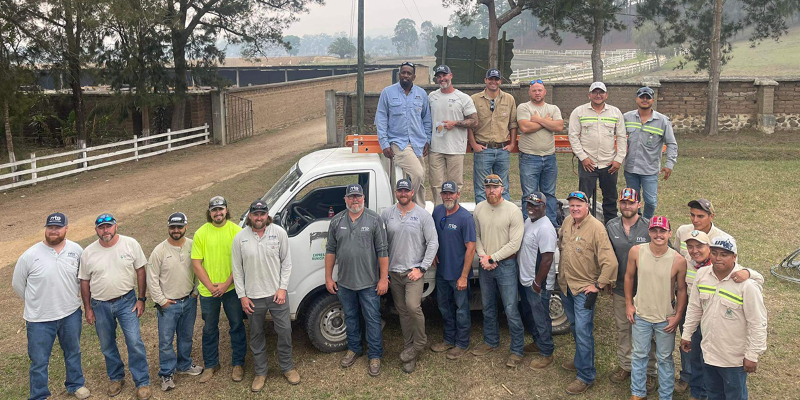Alabama, Tennessee Co-ops Power Up Guatemalan Village

Last May, volunteer line workers from Alabama and Tennessee electric cooperatives spent more than two weeks working to bring electricity to a remote village in Guatemala. Coordinated by the Alabama Rural Electric Association of Cooperatives (AREA) and NRECA International, the project had its share of challenges, but the team ultimately succeeded in connecting about 25 families to the grid. CFC and NCSC were proud to support the mission with $70,000 in grants.
Prior to this trip, AREA had coordinated a similar trip to Bolivia just before the COVID outbreak. When the post-COVID schedule opened for international work, several Alabama cooperatives requested the statewide get involved again.
“We have really seen the difference in our employees who go on these trips,” AREA Vice President of Statewide Services Matty Garr said. “In the U.S., we take so much for granted, but when you travel outside the U.S. on missions like this, and see how other people live, you begin to appreciate how fortunate we are in America. The knowledge and experience these employees return with is contagious and lifts morale for all our co-op members that participate.”
In addition to the Guatemala mission, AREA and Alabama cooperatives also participated in the Light Up Navajo program last year. That initiative, coordinated by the Navajo Tribal Utility Authority and the American Public Power Association, organized volunteers from 48 utilities—including 16 electric cooperatives across five states—to bring electricity to families in need in the Navajo Nation. From April through July, those volunteers connected 170 homes to the electric grid for the very first time.
For the Guatemala project, AREA and the Alabama cooperatives teamed with Middle Tennessee Electric (MTE), which wanted to participate in its first international electrification project. In true Tennessee style, MTE sent 10 eager Volunteers to fill out the 21-man crew.
On the Road to Guatemala
The remote location and difficult terrain of the village of Las Peñas, in the southeastern region of Jalapa, posed some problems—but they did not stop the mission.
“As with any aggressive project, we ran into some issues that slowed down the work we had planned,” Garr said. “Adjusting to the food and elevation were our biggest challenges.”
Several members of the crew came down with food-related illness as they adjusted to the different diet in Guatemala.
“The higher elevation and remote terrain were also major issues that had to be overcome and delayed completion of the project,” Garr said.
The elevation in the village of Las Peñas is about 6,200 feet above sea level. By comparison, Alabama’s average elevation is about 500 feet, while Tennessee’s is 900 feet.
Without access to modern vehicles and equipment, virtually all the work involved running line up and down the mountains, through heavy vegetation and across ravines, which had to be done by hand.
Locals Step Up To Help
The local municipal electric utility, Empresa Eléctrica Municipal de Jalapa, helped with the work, and will be responsible for operation and maintenance of the new lines.
“The local utility was very much involved and dug holes and set poles before and during the project,” Garr said. “They also helped transport materials and provided additional labor during the build. The villagers also were involved and helped run and pull line during the project. They also assisted during the wiring process within the individual houses and loved the interaction with our crews.”
In the end, the team constructed five miles of primary system line, 2.5 miles of secondary line, installed transformers and did service drops and basic internal wiring to connect nearly two dozen homes and a church/community center to the grid.
Thankful for Power
For a rural, farming community like Las Peñas, access to electricity makes life easier. The villagers can cook without fire, store perishable foods in refrigerators and wash clothes using electric washers. Even more important is the brighter future it enables for the children, who now have light to complete their schoolwork at night and internet access to further their studies.
“These people did not have much, but they were so happy to see us and get power into their homes,” Garr said.
The line workers, some of whom had never been outside the U.S. before, also had an eye-opening experience, and all those who went said they would like to participate in another international project.
“It was an unforgettable experience,” CVEC line worker Billy Huffaker said. “The people were extremely nice and appreciative.”
CVEC line worker Matt Walker said: “You don’t realize how good you have it until you see how other people live. It was a great feeling to be able to help people who really need it.”
“It was a very humbling experience,” CVEC line worker Matt Jeffers added. “I think everyone should go. It makes you grateful for what you have.”
CFC, NCSC Grants Provide Vital Support
The CFC and NCSC grants helped to fund the purchase of materials and cover travel costs and other expenses.
“We use a three-year planning cycle to prepare for an international trip. As soon as one trip is completed, we begin raising funds and seeking volunteers for the next trip,” Garr said. “These trips are not cheap, and we could not do this without CFC’s and NCSC’s support, or we would be forced to wait an additional two to three years between projects.”
AREA plans to support its members’ participation in future international projects when the opportunity is available.